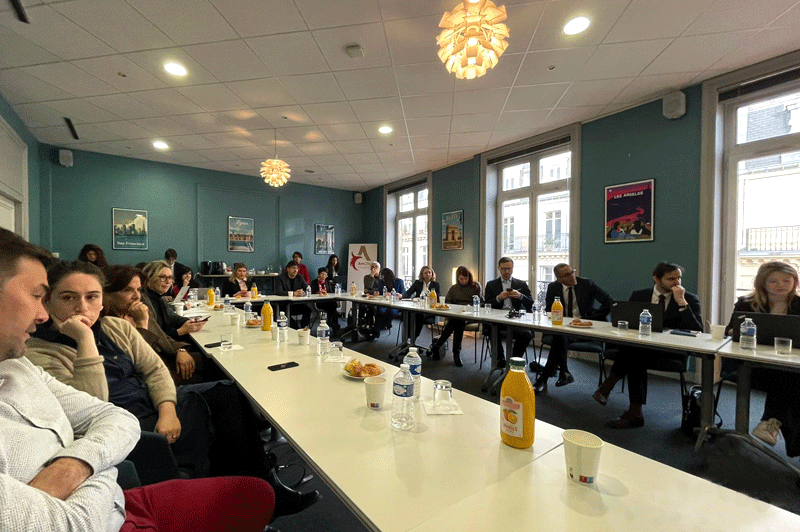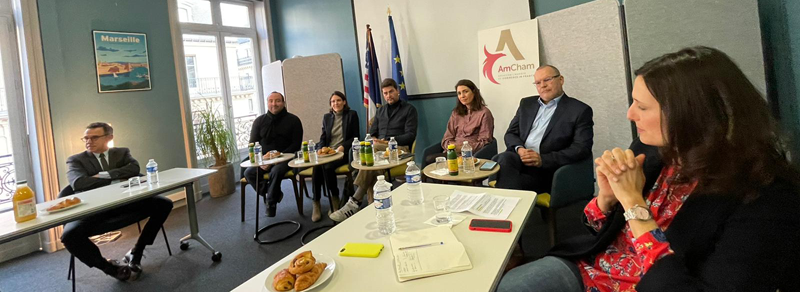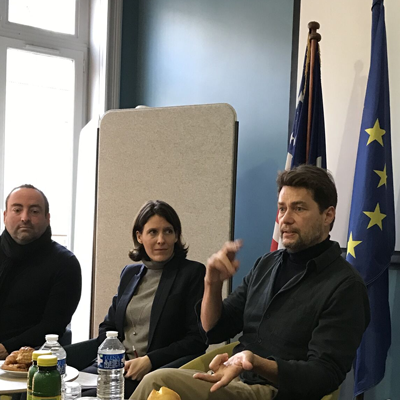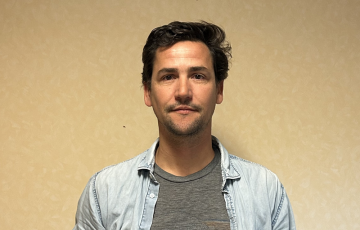Debate: what are the best tools to improve digital education & expertise in France ?

An event organized at AmCham France in Paris, in partnership with Provence Promotion.
AmCham France – the American Chamber of Commerce in France – and Provence Promotion are joining forces to address a key challenge facing American businesses as they develop in France. Today, 60% of French employees do not have the skills and expertise required to support the digital transformation of their companies. So how can more training be provided for digital professions? And what are the best solutions to create a genuine digital talent pool in France?
These questions were given to a group of experts in digital education: the heads of training programs at two tech giants, Cisco and Google, as well as leaders from Hi! PARIS, the elite education hub in Paris dedicated to AI & data, thecamp digital training campus in Aix-en-Provence, and the inclusive digital training school La Plateforme in Marseille. The resulting discussion took place during a breakfast meeting on February 1 in Paris and it provided some illuminating answers.

There is an ever-growing need for digital talent in the job market and digital technology is a source of vast opportunities for job creation. But, despite this, according to a recent study by the management consulting firm Korn Ferry, France could suffer a shortfall of 1.5 million skilled digital employees between now and 2030, which could entail nearly €175 billion in lost revenue potential for the national economy. So, while leaders in the tech sector are already working to address this problem, broader public and private efforts are required to train more people on a larger scale.
Diversify the types of candidates and expand hiring methods in the digital sector
For more than two decades, Christophe Dolinsek, the director of the Cisco Networking Academy in France, has devoted himself to expanding and diversifying the digital workforce. The Cisco Networking Academy is a global education program that was launched in 1997 to alleviate the shortage of digital talent in the United States. “We provide free training in IT and networking. In France, we work with government officials from the ministries of labor, education, and industry to ensure we teach the skills that recruiters are looking for,” explains Christophe Dolinsek. “The program doesn’t only train engineers but technicians as well. In the 20 years of its existence in France, it has enabled 300 000 people to enter the job market.”
La Plateforme, a school based in Marseille that is dedicated to a new vision of digital education, has the same mission. Launched in 2019 in the neighborhood that is home to the new Euroméditerranée district, it aims to provide digital training to people from all walks of life, with a special focus on welcoming youth from difficult neighborhoods, people suffering from long-term unemployment, and employees who need retraining to keep their place in the labor market. La Plateforme is open to everybody regardless of their income or existing qualifications, and the school will play a key role in meeting the French government’s goal of training 400 000 people in digital technologies by 2030.
There is the additional challenge of recruiting and training more women, whose already low participation in digital professions is on the decline. Another goal is to raise awareness about the digital world among the very youngest students, which is why one of the pillars of the digital education strategy is to train more teachers.
Lifting company barriers to achieve greater inclusion
To address the limited pool of digital talent in the job market, companies will also have to change their recruitment tactics and embrace a wider definition of digital talent.
 "To stop systematically thinking that engineers with five years of higher education are the only solution, companies must focus on the actual digital skills of candidates. Even if mindsets are changing, it’s still important to remove obstacles and demonstrate the value of different or alternative career paths that can lead to employment in the sector,” says Cyril Zimmermann, who founded La Plateforme with the support of an alliance of 50 companies in the Aix-Marseille area. "Inclusive schools like ours have highly selective entrance exams. Only one application out of seven is accepted. So we also cultivate excellence!”
"To stop systematically thinking that engineers with five years of higher education are the only solution, companies must focus on the actual digital skills of candidates. Even if mindsets are changing, it’s still important to remove obstacles and demonstrate the value of different or alternative career paths that can lead to employment in the sector,” says Cyril Zimmermann, who founded La Plateforme with the support of an alliance of 50 companies in the Aix-Marseille area. "Inclusive schools like ours have highly selective entrance exams. Only one application out of seven is accepted. So we also cultivate excellence!”
By using their dedicated CPF account for continued professional training, managers can also improve their digital fluency. This is another important factor in digital education, and to this end, for the past ten years Google has been running regional digital workshops for leaders from small and medium-sized businesses, independent professionals, and artisans. Thanks to support from the Chamber of Commerce and Industry Aix-Marseille-Provence, Marseille was an early partner in Google’s initiative.
Economic stakeholders in Aix-Marseille want to ensure the metro area’s business ecosystem remains competitive, so they are working to create a virtuous circle to accelerate the digital transition. The goal is to train 20 000 digital talents locally over the next seven years and become the European epicenter of digital technology. The territory is already well-positioned to develop a top digital ecosystem of companies and talent. Aix-Marseille is being supported by the French government’s specialized “Grand Marseille” program to give digital training to young people, it is ranked as the world’s #7 internet connection hub thanks to its digital and telecommunication infrastructure concentrated at the Port of Marseille Fos, and its network of digital leaders, start-ups and training centers led the metro area to be named the European Capital of Innovation in 2022.
On the national level, France is committed to making its digital economy more inclusive and diverse, and the large American companies already present in the country can contribute to this effort because their leaders are already working on this issue.
Intersecting skill sets will broaden horizons for future graduates
For Raphaëlle Gautier, the executive director of Hi! PARIS, it’s important to go beyond the highly specific skillsets that were once the norm and to offer broader multi-disciplinary training instead. “France and Europe are behind the United States and Asia. We want to produce graduates who are well-versed in engineering, management techniques, and the creative aspects of digital projects. This triptych is extremely crucial in the fields of AI and data science.”
Created in 2020 by the elite schools Institut Polytechnique de Paris and HEC Paris, and recently joined by the Centre Inria de Saclay research center, Hi! PARIS is a center dedicated to artificial intelligence and data analytics for science, business, and society that focuses on the cross-fertilization of expertise. When asked about ways of attracting and retaining talent in the digital sector, Raphaëlle Gautier noted that it was crucial to emphasize the wider possibilities of technology. “Making digital professions attractive also means showing they have meaning, that they can serve positive objectives for our society and our environment,” she said.
Accelerating the roll-out of digital education by creating specialized ecosystems
 At the thecamp digital campus in Aix-en-Provence, there is a similar approach when it comes to connecting digital transformations to solving the problems facing society and the planet.
At the thecamp digital campus in Aix-en-Provence, there is a similar approach when it comes to connecting digital transformations to solving the problems facing society and the planet.
According to Kevin Polizzi, a Marseille-based entrepreneur with a string of digital successes who recently became president of thecamp, it is essential to organize training ecosystems to create a synergy when it comes to digital education. He made a point of citing the links that will be formed between digital actors in Aix-Marseille, such as the L’Épopée innovation village and the soon-to-open Theodora smart campus. “With L’Épopée as a source of talent, La Plateforme and Theodora to train them, and, finally, thecamp to provide people with professional training throughout their careers, we are creating virtuous circles. We’ve made a point of structuring investments in the Aix-Marseille metro area to create a genuine pathway for gaining digital expertise that is accessible to everybody,” he said. “Digital technology is not a one-off skill to teach; there must be an ongoing process that develops people’s capacity for employment.”
As a continuation of the digital workshops program, Google announced in November that it was offering 10 000 online training courses to groups that are traditionally underrepresented in the digital professions. This effort is a clear commitment to both digital inclusion and the competitiveness of the French tech economy.
Provence Promotion has been a member of AmCham for three years. This membership allows the agency to create connections between companies in Aix-Marseille and American investors based on specific sectors or economic issues. AmCham France was founded in 1894 to promote economic exchanges between France and the United States.


 +33 4 96 11 60 00
+33 4 96 11 60 00







